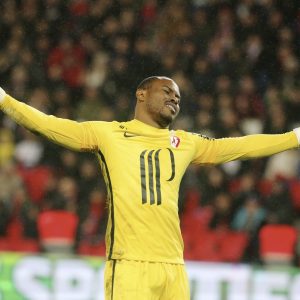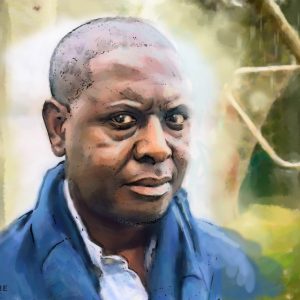How Romelu Lukaku has shamed sceptics – and racists
The Belgian has endured criticism and abuse, some of it owing to his skin colour, but he has risen above it to become one of the world’s best strikers and a valued voice in the fight against racism…
Author:
2 July 2021

The surrealist artist René Magritte was not a patriot. “I despise my own past and that of others,” he wrote of his native Belgium. Magritte’s paintings were often witty and thought-provoking. He was, along with fictional characters Tintin and Hercule Poirot, a famous Belgian. So is the cyclist Eddy Merckx.
In the past decade, Vincent Kompany, Eden Hazard and Kevin De Bruyne also became prominent Belgians. They played their way into the global conscience with their fine skills and unique interpretations of the game. This season, Romelu Lukaku exploded to become a star in his own right.
During a 2020 Uefa European Championship match on Saturday 26 June, on a night when football seemed to matter a little less after Christian Eriksen’s collapse, Lukaku took the knee and raised his right fist. He got roundly booed by the Russian fans in the stands, but stood tall to dispatch his opponents with two strikes to symbolise that he has become a new leader who transcends the game, fighting racism and uniting a surrealistic, divided country.
Related article:
Born on 13 May 1993 in Antwerp, son to Adolphine and Roger, who was a footballer, Lukaku endured an impoverished childhood. At times, proper milk and even electricity were a luxury. Rats ran around the apartment. Those circumstances instilled a young Lukaku with an iron will, maturity and the belief that he could play his way to a better and brighter future for his family. At least, that was the plan.
His first senior coach at Anderlecht, Ariel Jacobs, never knew that the Lukakus were struggling. “I think he decided ‘this has to stop and I want to work for it’,” recalls Jacobs. “His discretion does him honour as a player and as a person.”
At 16, Lukaku debuted for Anderlecht against Standard Liège in a high-stakes match he has called the craziest day of his life. Jacobs remembers him as a generational talent with lethal instincts and an impressive physique, but there was no way of telling he would become an elite striker for both Belgium and Inter Milan. At junior level, there never is.
Above all, Jacobs was struck by a quality that would come to define – and at times almost consume – Lukaku: his inquisitiveness. Lukaku has always craved to improve and polish his game. “He is a perfectionist and wants to learn from everyone,” explains Jacobs. “That eased his integration into the senior team. That quality is almost primordial for his talent to score goals. His mindset was almost perfect.”
Childhood dream come true
In 2011, Lukaku moved to Chelsea, the club he dreamt of playing for as a child. Jacobs warned him that a football career is full of vicissitudes. The teenager, however, dismissed the prospect of spending time on the bench in London. “Lukaku told me, ‘No, I am not going to be benched. That’s impossible. That won’t happen,’” recalls Jacobs. “But it did.”
Predictably, the youngster dropped in the pecking order behind Didier Drogba, Fernando Torres, Salomon Kalou and Daniel Sturridge in the star-studded squad. “That was the first flashpoint,” says Jacobs.
From the glamour and glitz and Roman Abramovich’s billions at Stamford Bridge, Lukaku moved to West Bromwich Albion. He was prepared to move to a smaller club to relaunch his career. Everton was again a step up before his transfer to Manchester United. All of those experiences contributed to his development. At Old Trafford, the Belgian was perceived as a flat-track bully and an incomplete striker. He stood accused of a heavy first touch, poor positioning and, at times, a profligacy in front of goal. As a result, he never looked convincing in his position and drew excessive criticism.

He moved away from England to Inter Milan in 2019. On the face of it, the Serie A was no fit for Lukaku, who requires space to attack defenders on the front foot. But Antonio Conte built the team around his No. 9 and the results were spectacular: Lukaku topped the goal-scoring charts at San Siro to lead his club to a first Scudetto in a decade. But it was the manner and ethos of Lukaku’s achievement that impressed, albeit not always.
Against Zlatan Ibrahimovic, he swore repeatedly, “Fuck you and your wife, you little bitch.” While the spat with Ibrahimovic came during a heated moment in the Milan derby, dragging the Swede’s wife into this highlighted football’s ignored misogyny problem.
‘100% own merit’
With his skill set fine-tuned, Lukaku has become a decisive force. Suddenly, he is no longer the bumbling striker, as labelled by the English press, but a meteoric star who is one of the world’s best strikers.
“His technical qualities have progressed and that’s not something you’d expect from someone who is almost 2m and 100kg,” says Frank Van Laeken, journalist and co-author of the book Vuile Zwarte (Dirty Black), which addresses racism in Belgian football.
“Similarly, you don’t expect such speed from someone so tall and powerful. It’s 100% his own merit.”
Related article:
At international level, that scepticism and doubt over Lukaku also persisted for a long time. At Under-16 level, Christian Benteke was preferred to Lukaku to lead the line. He was relegated to the left wing, according to Jacobs, and it was a decision that prompted Lukaku to retire from the junior national teams.
It wasn’t just the coaches who doubted Lukaku. In his first 20 matches for Belgium, he scored just three goals, which was far from convincing. But above all, his somewhat clumsy style with a heavy first touch and debatable positioning irked the majority of Belgian fans. They didn’t embrace him as one of their own. They failed to do so when he was Everton’s top scorer in the Premier League and they failed him even when he wore the shirt of Manchester United.
“From the start, the fans wanted Lukaku to play like Hazard or De Bruyne, but he is not like them. He doesn’t claim that either,” says Jacobs.
Struggle against embedded attitudes
But Van Laeken is convinced that the Belgian public’s disapproval of Lukaku was partially steeped in more sinister motives. “People with different ancestry or a different colour of skin have a tougher time getting accepted in Belgium,” he says. “They have to be so superb that people can’t ignore them, like Kompany. Today, Kompany is hardly seen as someone Black but mostly as someone who excelled at the game and is now building his coaching career.”
In the past, Kompany, alongside musician Stromae, were a symbol for “Belgitude”. They embodied a new generation of Belgians of mixed origin who transcended the division between the Flemish and Francophones and were supposed to help eliminate prejudices regarding integration and multiculturalism.

But Kompany, and now Lukaku, can’t change the behaviour of the electorate. They bring a feel-good factor to the Belgian fans, 90-minute patriots, but below the surface racism simmers everywhere in society. In 2014, the right-wing New Flemish Alliance won 33% of the vote. Polls suggest it will lose ground this year, with the far-right party Vlaams Belang winning as much as a quarter of the vote.
Lukaku is Kompany’s heir. He is “incontournable” – no one can touch him. His stardom has allowed him to be more outspoken and expressive and become a leader alongside De Bruyne and others in the national team, which has been taking the knee ever since the Nations League match against Denmark last September. “It has to do with Lukaku’s presence, who morally compels the team a bit to take the knee,” says Van Laeken. “He doesn’t shy away from the racism debate. To the contrary, he takes it on.”
In Italy, racism is obstinate, the incident at Cagliari with Inter Milan but an example. In Saint Petersburg, the supporters’ booing at kickoff rendered Lukaku’s stance a powerful and symbolic image. Lukaku kneeled for the values he believes in and wants to defend, unlike many others in football, and that courage and persistence against all the odds have been surreal.


